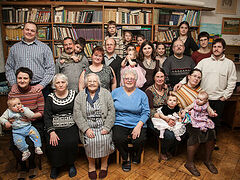Sometimes I have planned to do an interview with a large family, but one of the spouses refuses. You never know what reasons people may have. However, a conversation with one of the spouses can also be interesting. And so it happened with Archpriest Roman Nikolaev, rector of two churches: of the Nativity of the Theotokos in the village of Rozhdestveno and of the holy Martyrs Faith, Hope, Love and their mother Sophia in the village of Pchelki (both near Moscow).
—Father Roman, please tell us about your family.
—My wife and I have been married for nineteen years now. Her first profession is icon-painting, but in the course of our family life she also studied to be a speech therapist and a clinical psychologist. We have six children, four daughters and two sons. The eldest, Maria, is seventeen; she studies in the eleventh grade of the Orthodox school of St. Sergius of Radonezh in Sergiyev Posad. She is preparing to enter a university and has chosen the Department of Economics. The second daughter, Ekaterina, is finishing the ninth grade of I.B. Olbinsky school, she is also preparing for admission now; she wants to study at a Chinese college—she is learning languages. The third daughter, Tatiana, is in the fifth grade at a secular school; the fourth, Elena, is in the second grade of an Orthodox school. Our son Daniel is almost five years old, and Mikhail is eight months old. All our older children attended a music school for piano lessons; Maria has already graduated from it and now she goes only to voice lessons. I sent them there to help me in the choir. Throughout their school years they used to sing in my church, and they still sing, although Ekaterina has exchanged music school for art school.
—Why do some of your children go to Orthodox schools, while the others go to secular ones?
—At the beginning of our family life I had the illusion that I would be able to protect my children from the outside world—I would give them an Orthodox upbringing, they would watch only the cartoons that I myself would choose, etc... And then I realized that this would not work. Children still see the realities of the world—and is it good to try and protect them from it as much as possible? We began to observe, compare, and came to the conclusion that it really makes sense to send children to an Orthodox school for the elementary grades and, when they grow a little, to send them to an ordinary school with in-depth study of subjects. Let them see other views of life and learn to defend their worldview. It seems to me that Orthodox parents often have a phobia that their Orthodox child can be infected with the world influences and become uncontrollable. And we had this phobia too, but then we saw that a meeting with the world is not as bad for children as it seems. They even become stronger in their views. Although it also happened that our children developed secular hobbies.
—What hobbies, for example?
—Music. But here it helped that they had already gone to a music school. When a child has already developed a taste, he becomes more discerning and can distinguish what it is worth listening to from what it is not worth listening to. He may get hooked on pop music, but then will overgrow it.
What else? Clothes. An Orthodox school has one dress code, and a secular school another, where girls may wear trousers. I don’t think it’s bad. Well, a girl will wear trousers, but if she stays in the Church and keeps her faith, then there is nothing to worry about at all.
From the first grade all our children went to church with me every Sunday. But at some point, I saw that they did it so as not to upset their father. And I gave the older girls the freedom to go to church only when they wanted to. One day, remaining in the Church should become for a child not what his parents imposed on him, but his personal choice. And in order to make a personal choice, you need freedom.
—And what did they choose?
—To my joy, they still go to church. Maybe not as often as before when I myself drove them every weekend, but they attend every other Sunday. They have large workloads now and they are preparing for exams. School is only half of their studie—the second half is tutors and preparation for exams. Sometimes my eldest daughter stays up until one in the morning, studying. It is better for her to get enough sleep, and she will go with us next time. This is our spiritual experience.
—When Orthodox parents seek to protect their children from the outside world, they are probably driven by the fear that their children will lose their purity too soon.
—I see that in essence our girls have remained pure children. I can say this because my daughters confess to me. We have maintained a trusting relationship, and I hope it will continue. The outside world does not influence them much, and they have already developed certain boundaries for themselves. I will say more: All the friends of our second daughter, who goes to a secular school, are from Orthodox families. Their former ties were broken, they feel the kinship of their souls. And if in the evening after school she goes for a walk, she walks with her Orthodox friends.
—The issue of trusting relationships with children is relevant for any parent. How have you managed to keep them?
—I made many mistakes—maybe that’s the secret. If I see that I have made a mistake in something, say, I was too demanding or too insensitive, I try to analyze this and improve my behavior. In general the process of child raising is dynamic. There are no golden rules that you first learn and then abide by without having any difficulties. I grew up as the only child in a family with only one parent, my mother. Then I had my own family, and over time I became a father of many children. To adapt to this new situation, I had to reconsider and reevaluate many things in myself. And this process is still going on. Maybe I won’t repeat the same funny and stupid mistakes that I made when my first child was born, but I will make new mistakes. As the children grow, new circumstances arise all the time. For instance, I have never had an eighteen-year-old child before. My eldest daughter will turn eighteen soon, so how should I behave with her? How can I build the relationship? This is a new experience. As in Christianity—at different spiritual ages we understand the commandments at different levels. Not to return evil for evil is one thing, but to pray for your enemy is another. The same is true in child raising.
—Can you approach a child and say: “I was wrong, forgive me”?
—Certainly. Sometimes my wife helps me. She says, “It offends her more to hear such things from her father than from her mother. You’ve hurt her.” When I realize this, I come up, hug my daughter and say some a few words: “Let’s make up, your dad was wrong.” Children look at your intention... It’s like with the Lord: The Good Thief repented on the Cross; his intention changed, and the Lord accepted it. It seems to me that when children see that you are trying to change, that is enough for them. They appreciate the intention, which shows that although the father makes mistakes, he is not heartless. And this strengthens your relationship, when children see that you are sincerely worrying and trying to correct the situation. You can forgive very much of someone who treats you sincerely, with love and care.
—How do you resolve conflicts between parents?
—It happens that a problem arises between spouses, and they understand that it is hard to solve it. What to do? Sit down, talk, pour out your souls to each other, and make efforts... If you see that your other half cannot change something in him- or herself, you have to make concessions. When there is a problem, but there is no dialogue, it will never be solved. I think it’s better to talk in a raised voice, even to quarrel, but not to ignore the problem. And even if you are unable to change your nature, you can pray to the Lord to help you do it.
Another important aspect is not to forget each other. Spouses often make this mistake. Everyday life, children, their illnesses and studies turn into an endless carousel. The mechanism is up and running, everyone in the family performs their duties, but behind the daily routine we stop seeing our other half. Therefore, you need to find opportunities to spend time together, say, sit at a cafe in silence over a cup of tea.
—Unfortunately, in some families, husbands push their wives around, citing a verse from the Scriptures as an argument: The wife see that she reverence her husband (Eph. 5:33).
—The fact is that they are neophytes...
—But it’s not just about them; it is also found in families that have long been integrated into Church life.
—Neophytes are not those who were baptized yesterday. Neophytes are those who have remained children spiritually. A person can go to church all his life and remain a neophyte. I read this passage from the Epistle of the Apostle Paul, which is read during the sacrament of marriage, and analyze during preparatory talks before the celebration of the sacrament and explain it this way. The wife is afraid to offend her husband, to lose his love, to hurt him with a rude word or impertinent behavior—that’s what she is afraid of. The wife is the keeper of the hearth, and the atmosphere that the wife sets in the family is the atmosphere it will have.
Wives are pushed around by husbands who are not Orthodox. Unfortunately, not every person who calls himself Orthodox is Orthodox. There are people in the Gospel called “Pharisees”. They knew the Holy Scriptures perfectly and were close to the Temple, but at the same time they were unable to accept the preaching of Christ. Whether a person serves in the altar or stands in the church porch, this is not a sign that he has become closer to God. You can hang crosses all over your body, but still remain a hypocrite with a callous heart that does not have compassion for anyone. The task of spiritual life is to become like God and to acquire Christian love for everybody. Not everyone can understand and accept this as a rule, because it is difficult. External things are easy to do—but try to make efforts to improve!
—What would you say to parents who believe that you should have children only when the time is favorable?
—Well, hard times are a relative term. If our grandparents were to look at us from the 1940s and we told them that we are having hard times, I don’t know what they would answer us. Having children is not a matter of comfort or discomfort at all. If you have love in your heart and you want to give it to someone, then you will have a baby in difficult times and thank God for it. And in general, you will be grateful for everything: that you are still alive, that you have something to eat and a roof over your head.
Meanwhile, we should not condemn anyone and demand labors beyond their strength. We have quite a few large families in Sergiyev Posad. I know parents who have four children, but they still live in a rented space. I wouldn’t have the heart to condemn them if they say: “We don’t want a fifth child.” Instability in life is really hard, so I will never bring myself to condemn anyone in such circumstances. As you understand, I am not talking about abortion—if a baby has already been conceived, its life must be kept! But if people do decide to have a child, this is worthy of respect, and in certain life circumstances it really becomes a feat. I think the Lord rewards such people already in this life.





